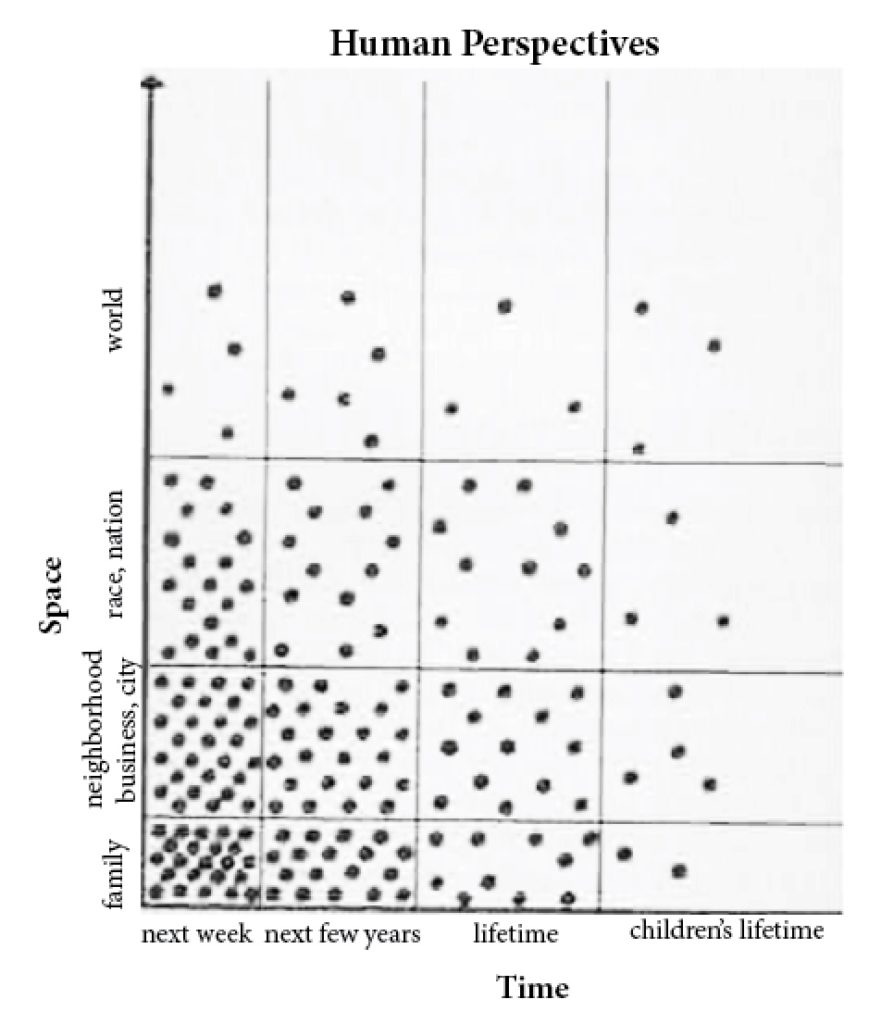Socrates is reputed to have said, “Great minds discuss ideas. Average minds discuss events. Small minds discuss people. Though all people, in their conversations, address issues in all three of these categories, the most intelligent typically engage in a discussion of ideas, because such topics provide the broadest perspective. By contrast, those of lowest intelligence seldom discuss concepts, but focus on gossip–the specifics of who did what to whom. Such conversations are easy to understand and tend to be emotionally based. For example, “She said what? Wow, what a bitch!’
In April 1968, about 30 of the world’s greatest thinkers gathered together to discuss the exponentially growing human population and the potential problems and solutions. Their book titled, The Limits to Growth, brought to light some issues that would be faced in the century ahead. They published the graph below, titled Human Perspectives, showing how few people have the opportunity to think about and address the long-term issues facing our species.

The lower left corner of the graph shows that most people are involved with immediate issues pertaining to themselves and their families. By contrast, the upper right corner shows the small fraction of humanity that has the opportunity to reflect on the long term. It is generally the intellectually elite and those with the luxury of free time who regularly contemplate the distant future and reflect on the rapidity of change and its implications.
The highly intelligent people I know, love to grapple with intellectually challenging problems such as:
• If a virus mutates, does the new variant become more or less contagious?
• What is the relationship between the mortality rate of a virus and its variant?
• Is it possible to use medical interventions to extend the average human lifespan to several hundred years?
• Does an electron exist only when it is measured?
• Does the concept of entanglement destroy Einstein’s postulate that no electromagnetic signal can travel faster than light?
• Will quantum computers eventually evolve into computers that far surpass their intellectually inferior human creators?
• To what extent is global warming a consequence of human use of fossil fuels and to what extent can we control it?
• Will the world population eventually expand beyond the earth’s ability to support it?
Most intelligent people, knowing that they have cognitive strengths, are reluctant to buy into the general consensus on such questions without independently evaluating facts for themselves. By contrast, the unintelligent, feeling less competent in their cognitive skills tend to adopt consensus opinions of the social tribes to which they belong. That is why major breakthroughs and paradigm shifts are rarely achieved by the unintelligent. In spite of this, our world is probably best served by having a mix of people at all intelligent levels, because those lacking high intellectual abilities often have compensating skills that make society function more fluidly. The independence of mind evident in the highly intelligent is both a blessing and a curse. For example, see: https://www.intelligence-and-iq.com/how-are-hi-q-people-similar-and-different-from-the-average-in-reaching-opinions/

If a virus mutates, does the new variant become more or less contagious? Less but more to surrounding biome
What is the relationship between the mortality rate of a virus and its variant? None a virus never dies, it is a binding sequence carrier.
Does an electron exist only when it is measured? Fundementally, lol, measurement is only relative to relative so the question is the only thing that exists is existance, but asking the question .: it proves existence lol.
Does the concept of entanglement destroy Einstein’s postulate that no electromagnetic signal can travel faster than light? Refer to Higgs, it is telepathy neither wave, or particle just a Death Valley which can be observed before the dawn. Em has a photon conversion coupling so in a way proves entanglement, in the sense that everything is everything. Delta zero Plato angle 72 degrees, symmetry building E8, large numbers or the family essence as the Greeks called reality.
Will quantum computers eventually evolve into computers that far surpass their intellectually inferior human creators. Computers are not zero couple binders, only system thinking abstraction. Musing that you could use quantum heavy elements and noble gases switching back and forward from zero point to one point coupling, so in way that is more a dimensional box computer than quantum.
To what extent is global warming a consequence of human use of fossil fuels and to what extent can we control it. Technosphere differential energy, micro data patching on its way. It is the ru way.
Will the world population eventually expand beyond the earth’s ability to support it? The population is decreasing especially with the technosphere cull. The only issue is that consciousness mind is in all, without harvesting of the global intelligence of all sentient beings, we are few. As one.
Thank you for your comments, Gump.